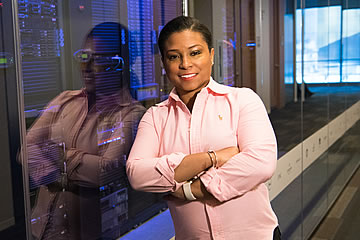Why We Need Role Models
Phyllis Ehrlich
Group Vice President, Spectrum Reach
 While we all grapple with so much uncertainty in our lives, we need positive role models more than ever. There are many definitions of the term “role model,” which was originally coined by sociologist Robert Merton. My favorite is: a person — or tapestry of people — who inspire you to become your best personal and professional self.
While we all grapple with so much uncertainty in our lives, we need positive role models more than ever. There are many definitions of the term “role model,” which was originally coined by sociologist Robert Merton. My favorite is: a person — or tapestry of people — who inspire you to become your best personal and professional self.
My incredible mother was my first role model. Beautiful, bright, and feisty, Mom was a force of nature. I was fortunate to have her as a guiding force and confidante for much of my adult life and miss her every day. Now being the matriarch of our family, I often ask myself “What would Mom say or do?” before making a decision.
Other great early role models can be teachers, professors, extended family, friends, or even someone you follow via social media or the web. It was my magazine writing professor in college who continually challenged me to stretch myself on assignments. He motivated me to dig deeper to find and bring stories to life. In my years as a magazine editor, I modeled his approach with my group of freelance writers.
PROFESSIONAL ROLE MODELS
Once we enter the job world, bosses and work colleagues organically become role models. When you’re in career launch mode, it’s especially important to model examples of professional behavior. As an editorial assistant straight out of college, my first boss, the editor-in-chief, taught me essential skills for being a strong magazine editor. Even more important, she was a role model for how a professional woman dressed and acted. I strived to emulate her style and grace.
When she entered a room, whether an internal, client, or industry meeting, everyone took notice. She smiled warmly and looked people straight in the eye, making them feel the center of her attention. She was poised and powerful. Later on in my career, I learned this is called executive presence — something to continually hone and improve.
The fact that my first boss was a wonderful role model was great fortune. But there are many ways to find role models of your own.
BE A KEEN OBSERVER
Who are people you admire the most? Who do you look up to? They may be family, friends, colleagues, athletes, celebrities, or humanitarians. And you don’t need to only look for living role models. Some of the best may have been dead for centuries. Think about the reasons you admire them, and jot down a list of the qualities, personality, behaviors, or accomplishments that you strive to emulate. Ultimately, the person you want to admire is also yourself.
Be a keen observer of others — very often the “role” of role models is to help you “see” examples of behaviors and successes that you want to adopt for yourself.
Look for role models who exemplify qualities and behaviors that align with your values.
For me, the most positive role models are people who embody integrity, empathy, professionalism, humility, optimism, and an innate desire to be better.
THE ANTI-ROLE MODEL
Have you seen someone at work implode due to bad behavior? What kind of boss or colleague don’t you want to be? Not all role models are positive. Sometimes negative role models can be helpful because they offer examples of harmful or disruptive behavior. Throughout my career, I have seen countless examples of self-centered people who ultimately self-destructed.
Remember that list of qualities you admire in positive role models. Take the opposite approach, and make another list of traits and actions you don’t want to exhibit, personally or professionally. Call this anti-role model behaviors.
Even when you may be tempted to lose your cool, remember that “must avoid” list, take a deep breath, and rethink your potential actions.
As you gain experience and confidence, aspire to also become a role model for others.
And don’t forget to stay in touch and thank role models for their contribution to your success. Who knows… some day they may consider you a role model, too.






